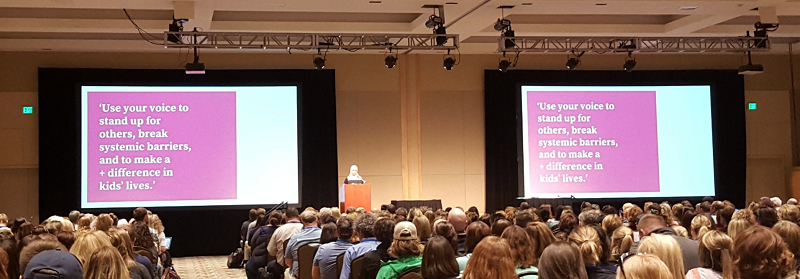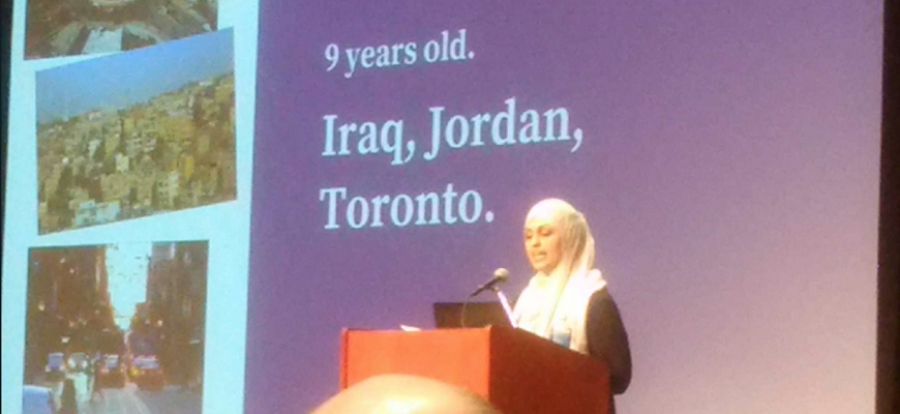You’re one of the minds behind The Writing Project, where you specialise in literacy and student voice. What is the purpose of this initiative?
The Writing Project is a student publishing platform that allows students to publish their writing, blogs, essays and reports, walking them through the writing process. My co-founder Mustefa Jo'shen and I created it upon seeing a need in the classroom for students to truly understand each step in the writing process, and more importantly to think critically and be able to form an opinion about the work they’re studying. Many of my former students were English language learners, and firmly believed that their voice and writing didn’t matter.
I created this platform to help teachers in getting students to believe that their writing can make a difference. Students now are able to write about relevant issues they read about and experience on a daily basis, such as the refugee experience, isolation, state violence against people of colour, and so much more! Many of us adults can’t discuss these issues, so the fact that students are writing about them just goes to show how powerful their opinions are in the shaping of our future.
The reason we came across your work is because you were once a refugee. We’ll link to your in-depth PBS piece on the matter for our readers, but in your own words please tell us about your journey as an asylum seeker.
Thank you for reading that piece! It was a hard one to write about, but felt it was important for people to see that refugees and migrants could be anyone you know. My family fled Iraq after the Gulf War, when there were still sanctions on the country. It was a dark time to be living in Iraq, as food and other necessities were scarce. When we fled to Jordan, we encountered a lot of discrimination there too. Many people didn’t understand why we fled Iraq. A lot of Jordanians were supportive of the Iraqi regime under Saddam Hussein, so they couldn’t easily empathise. Despite that, my experience in Jordan was still something I’ll always remember.
The country is beautiful, and its people generally were kind. We stayed there for a year, until our sponsorship application came through for Canada. In Canada though, being there as an English language learner, as a refugee, as a visible Muslim girl, my experience was vastly different. And of course, culture shock hit.
The hardest part of being a refugee isn’t fleeing your country, leaving your friends and everyone you’ve ever known behind. For me, the hardest part was being an English language learner in a country that sees you as a foreigner. While Toronto is a diverse city, there are still obstacles and barriers for people of colour, especially asylum seekers. There are language and cultural barriers, but there are also systemic barriers that act as gatekeepers to those who are marginalised. It’s why I always encourage everyone to understand anti-racism and equity training, to appreciate its importance in education and the workplace.
Why is it important for schoolchildren to be educated about refugee crises?
Kids need to understand and be educated on the refugee crisis for many reasons. One of the biggest is to help them see and get a grasp on the privilege they have compared to the refugee kids and asylum seekers. It’s important that we look beyond our inner circle of comfort and see what’s going on in the world, in the hopes that kids today would be able to change the future. I also encourage kids to understand the refugee crisis to change their perspective on the issue, to shatter the myths and stereotypes most societies have about refugees and asylum seekers. Refugees aren’t dangerous, they are people running away from danger, hunger, war and poverty happening in their country.

How can schools promote social consciousness and equality?
There are many ways to promote social consciousness and equality in schools. It starts with leaders often. Leaders need to promote and create a safe culture where everyone feels heard. They also need to open up opportunities. This may look like hiring more people of colour, or amplifying teachers of colour on staff and supporting their work and projects in school. The libraries could also be such a source of empowerment when there are books that represent all cultures, ethnicities, backgrounds and issues. Teachers can and often do so much inside of the classroom to bring light to issues that truly matter to every child. To ensure that all voices get heard in the classroom, we must provide different opportunities for students to express themselves.
Lastly, a strong focus on equity and anti-racism training when it comes to teacher professional development could improve the school culture, and create a safe environment for everyone.
What tips would you recommend for schools looking to teach their pupils about Islamic culture and current events, particularly those in areas with small Muslim populations?
I always refer educators to the ‘Debunking Stereotypes About Muslims and Islam’ resource by Teaching Tolerance. It’s heavily American-focused, but still contains great resources on debunking myths about Muslims and Islam. I think that’s one area that educators can focus on, as there are a lot of myths and misconceptions about the religion and those who practice it.
What do you hope to achieve in 2018?
I am launching a centre for innovation in my neighbourhood! It’s a huge leap in my professional career, so I am hoping that it will be a successful endeavor. Many people in Parkdale don’t have access to technology and innovation to be able to launch a business or improve their career paths. I aim to work closely with both organizations and the community to be able to fill a need and create pathways for success in the neighbourhood. I also hope to continue to work with as many schools, educators, and students as possible, to work with them on empowering each other to discuss issues of equity and diversity in schools.
Want to receive cutting-edge insights from leading educators each week? Sign up to our Community Update and be part of the action!


















